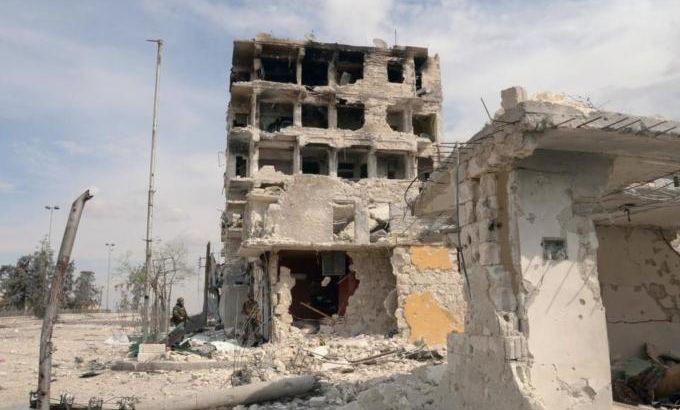Syria intensifies bombardment of rebel areas
Heavy bombardment of Idlib, Homs and other areas reported as Turkey and Syria exchange fire for seventh straight day.

Syria’s military has intensified its aerial and ground bombardment of rebel-held areas around the country, particularly in the provinces of Idlib and Homs, activists say.
Government fighter jets bombed the town of Maarat al-Numan in Idlib early on Tuesday, forcing many residents to flee their homes.
On Monday bomb blasts had rocked areas around the Syrian capital.
Government officials said a suicide bomber detonated a car bomb near a compund of the Syrian intelligence in Harasta on the outskirts of Damascus, while another blast took place in the Jobar area.
In Homs, heavy clashes were reported on Monday between government forces and opposition fighters in Homs’ al-Khalidiyeh neighbourhood, as videos posted online appeared to show barrels of TNT explosives being dropped on the besieged areas.
Opposition strongholds in Homs have been under siege for at least 120 days, with humanitarian conditions continuing to deteriorate.
Speaking to Al Jazeera on Monday, Raji Rahmet Rabou, an activist in Homs, said: “The siege is a huge problem for us. We are dying every day, but nobody is paying attention to us.
“The last two days have been especially intense as the shelling has not stopped.”
Fighting in north and east
The northern province of Aleppo and eastern Deir Az-Zor province also witnessed clashes between President Bashar al-Assad’s troops and opposition fighters on Monday, activists reported.
In the southern province of Deraa, 20 people were reported killed in Karak al-Sharqi, including at least five rebel fighters, the UK-based Syrian Observatory for Human Rights (SOHR) said.
The SOHR reported that some of the deaths came as troops targeted cars ferrying wounded people to field hospitals and clinics for treatment.
Al Jazeera was unable to independently verify the reports of fighting due to restrictions on reporting inside Syria.
The fighting inside Syria came as Turkey’s military struck back at Syrian military positions for a sixth day after a shell fired from Syrian territory landed in a Turkish border area, reports said.
Turkey retaliated in kind after the Syrian shell landed in Altinozu district, in southeastern Hatay province, at around 12:00 GMT on Monday, a Turkish official told AFP news agency on condition of anonymity.
“Turkish military retaliates immediately after every single Syrian shell,” said the official. “We have anti-aircraft batteries pounding Syrian targets.”
Earlier, Celalettin Lekesiz, Hatay’s governor, said a total of six Syrian shells had hit the province so far, without any casualties.
It was not immediately clear if the governor’s figures included Monday’s shelling – the sixth consecutive day of Turkish retaliation.
‘Worst-case scenarios’
Abdullah Gul, Turkish president, gave warning again on Monday against a spillover of the Syrian conflict into Turkey.
“The worst-case scenarios are taking place right now in Syria … Our government is in constant consultation with the Turkish military. Whatever is needed is being done immediately as you see, and it will continue to be done,” Gul said.
“There will be a change, a transition sooner or later … It is a must for the international community to take effective action before Syria turns into a bigger wreck and further blood is shed, that is our main wish,” he told reporters in Ankara.
For his part, Ban Ki-moon, the UN secretary-general, has raised concerns about arms supplies to both President Assad’s government and rebel forces.
“I am deeply concerned by the continued flow of arms to both the Syrian government and opposition forces. I urge again those countries providing arms to stop doing so,” he said at the opening of the World Forum for Democracy in Strasbourg, France, on Monday.
“Militarisation only aggravates the situation. I am calling on all concerned to abandon the use of violence, and move toward a political solution. That is the only way out of the crisis.”
‘Dangerous fallout”
The UN chief also spoke of a “dangerous” fallout from escalating violence along the Syrian-Turkish border.
“The escalation of the conflict along the Syrian-Turkish border and the impact of the crisis on Lebanon are extremely dangerous,” Ban said.
Turkey’s parliament has given the government the green light to use military force against Syria if necessary, while the UN Security Council has called for restraint between the neighbours.
Shells which killed five civilians on Wednesday at Akcakale, in Sanliurfa province, prompted Turkish retaliatory fire which has been repeated with every new Syrian shell that lands across the border as Assad’s government battles rebel fighters.
Against this backdrop of escalating tensions, Abdulbaset Sieda, head of the opposition Syrian National Council, reiterated his group’s call for foreign military intervention to support the rebels.
“We have called for a no-fly zone [and] humanitarian corridors to protect civilians,” he told Al Jazeera in an interview from Syrian province of Idlib.
“We now have three million internally displaced people and half a million refugees in neighboring countries. These huge numbers require international protection.
“If they are not able to impose a no-fly zone, then provide our fighters on the grounds with anti-aircraft weapons to pre-empt further air strikes and destruction.”